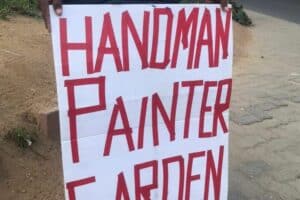'The country is running out of time to solve these issues. Everything is collapsing. The ANC is basically heading to an electoral disaster.'

Despite President Cyril Ramaphosa saying significant strides were made in transforming SA’s economy, the country continues to sink into an economic slowdown which paints a bleak picture for the future.
Statistics SA yesterday revealed in its quarterly financial statistics that the total turnover of industries in the first quarter of 2023 was estimated at R3.24 trillion, a decrease of 3.2% compared with 2022’s fourth quarter of R3.35 trillion.
ALSO READ: Economy loses 97 000 jobs in a year
“Between the fourth quarter of 2022 and the first quarters of 2023, (within the formal business sector) turnover decreased in six industries, with the largest percentage decrease in turnover recorded in manufacturing at -6%,” Statistician-General Risenga Maluleke said.
The survey also revealed it was followed by trade at -3.8%, electricity, gas and water supply -3.6%, mining and quarrying -1.6%, construction -1.1% and transport, storage and communication -0.6%.
Low growth
According to Thokozile Madonko, senior researcher at the Southern Centre for Inequality Studies at Wits University, technically SA was already in a recession, “which we have been avoiding ever so slightly”.
“But what it means is our economy is in a low growth, high unemployment environment in a context of enormous inequality and poverty,” she said.
ALSO READ: Unemployment stays high, exacerbated by rolling blackouts
Earlier this year, the national statistics agency noted SA recorded slight growth in the first quarter of 2023, shoving off the spectre of recession by 0.4% in the first three months of the year, following a decline of 1.1% in the last quarter of 2022.
“The manufacturing and financial industries were the main drivers of growth on the supply side,” it said.
Economy losses jobs
The economy lost another 97 000 jobs in the formal nonagricultural sector between March last year and March this year.
“The trade industry bore the brunt of the job losses, with a decrease of 36 000 jobs. The business services sector was second, with a decline of 32 000 jobs, while the transport and construction industries both experienced a reduction of 2 000 jobs,” Stats SA said.
ALSO READ: Illicit trade: SA economy loses R100 billion annually
Madonko said looking at all of these factors “the future definitely looks bleak; we really need a thriving public and private sector”.
“We have to continue to support the Presidential Employment Stimulus. It’s a good plan. The Expanded Public Works Programme is showing some success in big members for employment.
“But at the same time, we need to look at the structural things impacting on business – everything that’s impeding. We need business to feel confident in the future and start slowly creating jobs,” she said.
SA’s potential to fix problems
Political commentator Chris Singh said while the country had a potential to fix things, “if we continue on this trajectory and lie about our reality, we will wake up to irreversible rates of unemployment, poverty and further inequality”.
“The country is running out of time to solve these issues. Everything is collapsing. The ANC is basically heading to an electoral disaster,” Singh added.
ALSO READ: MultiChoice loses more than 100 000 subscribers – blames load shedding and economy
Asked about electricity generation, Madonko said it will translate to economic progress only in summer.
“Winter is slightly different for manufacturing, so it’s really what they’ll be able to deliver in summer that is important.”
In its latest report, credit ratings agency Moody’s said SA was in the midst of the worst energy crisis in decades as load shedding continues to cause significant disruption and reduced business confidence, while raising labour market uncertainty.
“It adds to existing asset quality and profitability pressures from persistently slow economic growth, high inflation and rising interest rates,” Moody’s analyst Vittoria Zoli said.
“While the electricity system will remain under pressure this year, recent government actions could offset some of the related credit pressures over the medium term.”
ALSO READ: Mining and manufacturing did better in March, but will this help SA’s economy?
“This adds to existing asset quality and profitability pressures from persistently slow economic growth, high inflation and rising interest rates.”
Stats SA also said increases were recorded in community, social and personal services +4% and real estate and other business services +0.6%.
Support Local Journalism
Add The Citizen as a Preferred Source on Google and follow us on Google News to see more of our trusted reporting in Google News and Top Stories.






